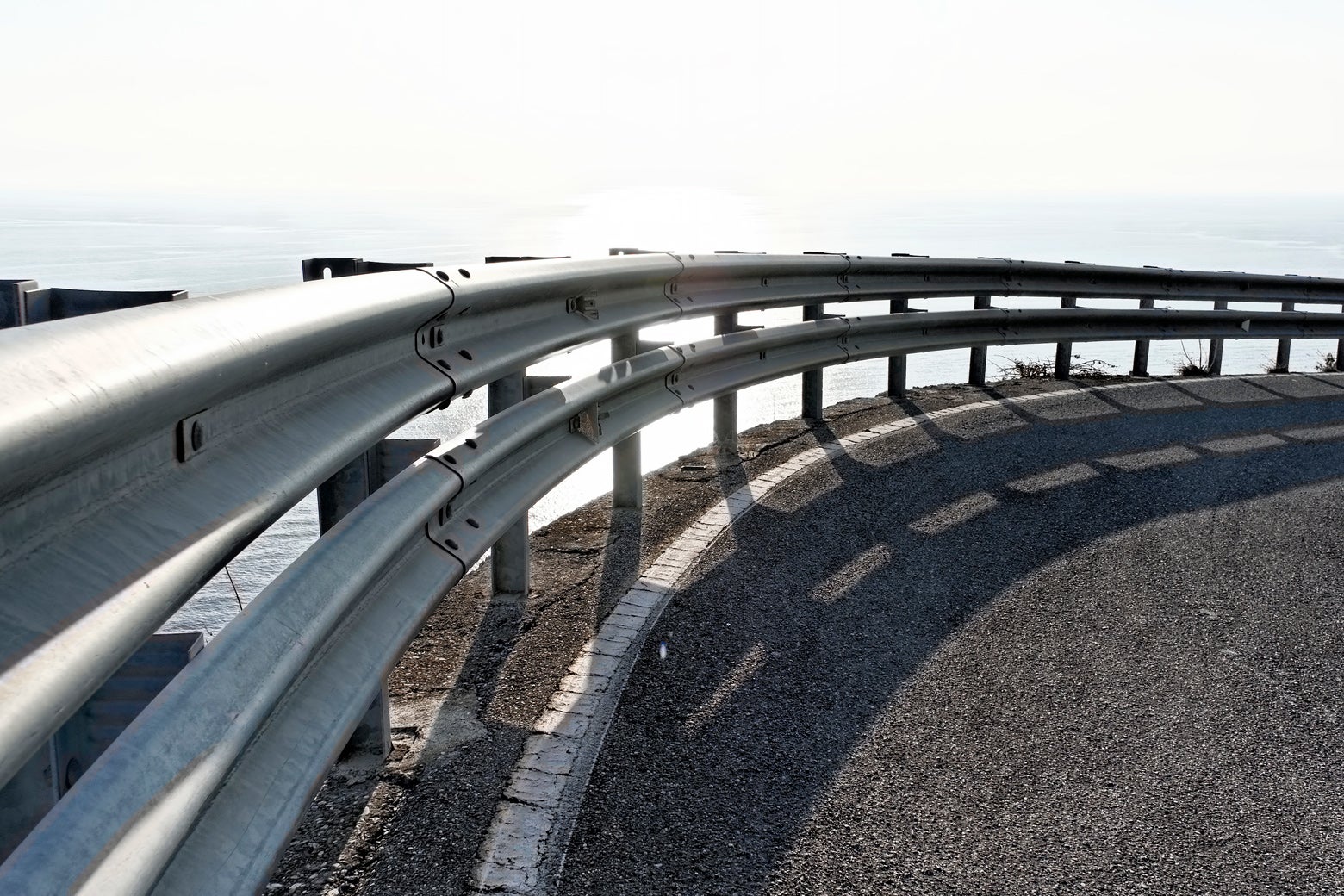- cross-posted to:
- [email protected]
- cross-posted to:
- [email protected]
There was a discussion a couple of years ago around gasoline taxes and how they are supposed to pay for roadway maintenance. The question came up about EVs. There were discussions about how to include EVs in the taxation system so they would pay for their fair share of the road. One of the options was to impose a tax attached to your vehicle registration based upon the weight of the vehicle. The greater the weight, the more wear and tear it produces on the road surface. This might be one solution to the barrier problem, namely moving the extra cost to the reason for the extra cost.
The “problem” with that tax is that if it’s applied fairly, it gets very big very fast. The damage to the road goes up with weight, but not linearly. Not a square factor, either. Not even cube. It’s to the fourth power.
Start applying that to long haul trucks and the whole industry will be bankrupt in a month. The implication being that we are all subsidizing that industry with taxes on roads. Including that one trucker with a “who is John Galt?” sticker on the back.
That said, this is also a very good argument for improving cargo trains to the point where most long haul trucking goes away.
Long haul trucking shouldn’t exist.
Neither should lots of short haul trucking, more specifically drayage trucking, that industry sucks. We probably need to move more towards vans and stuff.
As a truck driver, I would like to ask, how would you acquire all the “stuff” you have bought over the years? I am reasonably sure most of it was not produced locally to you. And the raw materials almost certainly aren’t locally sourced. Trucking and logistics generally has its issues, and you only have glimpsed a fraction of them, but it is absolutely necessary for modern society. Unless you’re proposing we kill off 2/3rds of humanity and go back to hunter-gatherer. Not a fan of that idea.
He’s proposing trains should do the ‘Long Haul’ portion.
Which have their own issues. Namely, to my knowledge, upfront cost and lack of flexibility. I’m sure there are others.
Here in the US, you are unlikely to find enough people willing to think far enough ahead for that to happen. Too many emotions guiding actions.
But if the true costs were quantized in the formula and not just externalized maybe it would suddenly make more sense. After all, in the end, society pays for it no matter what.
The cost has already been paid. Even small farming communities have rail line access that’s mostly been abandoned because the line owners switched business models.
As for flexibility, again, that’s mostly an issue with how rail line management has evolved. From shorter more frequent trains to ultra long infrequent trains. Mostly to cut the cost of staffing.
The solution is simple, nationalize the rail service. Put it under the USPS and have them figure out scheduling to optimize the speed of goods shipping.
The current state of the rail system is entirely due to the monopolistic nature of ownership. The incentive is to increase prices as much as possible while shipping to the fewest stops possible. Profit motives are in direct conflict with generalized shipping.
The reason trunking works today is the public nature of roads. Well, why shouldn’t rail lines be equally public? We practically gave the property away to the current rail owners with the notion it was for the public good… They’ve failed that.
Even if we put 100% of freight on trains, and expand the existing rail network 10x, the need for trucking infrastructure would not decrease by any significant amount. Trains can’t stop at every single business that needs freight, and trucks are still needed to get that freight from the railport to its destination (this is called “last mile” freight, but it can be up to a few hundred miles depending on where the nearest logistics hub is compared to the destination).
By the way, we already use trains significantly. Look up the intermodal logistics network. The general concept is smaller trucks pick up freight from different businesses, consolidate it in a single warehouse, then the freight gets put on full size trucks to move to the nearest railport and the trailer is loaded on a train which carries it as far as possible, then the reverse happens at the other end. The vast majority of freight movement uses this method.
You’ve moved away from the part which specifies long-haul trucking. To my understanding this is an area where trains are a reasonable solution.
Last mile coverage we also have room for improvement with much smaller vehicles, like bikes.
My point is that long haul is a very small minority of long-distance freight. Anything that can fly, does. Anything else will go on a train if a route exists (this is where rail expansion would help, but there are other problems with that we won’t address). The only freight that travels long-distance is truckloads that can’t fly (hazardous goods that are dangerous to put on a plane, or stuff like certain foods that could be damaged by the pressure changes in flight) AND doesn’t have a good train route to take. My cross-country routes were always stuff like fresh produce or other foods that would be damaged by the pressure. Everything else would travel a few states, but never from one coast to the other.
And you can’t put 3 full pallets on a bike, you’ll always need trucks to some extent.
So? That money is still coming from somewhere. If the freight industry can’t afford to pay then it means we are subsiding them CURRENTLY. They by the very nature of capitalism deserve to go out of business
True but unfettered capitalism is a terrible model.
So much of that freight should be moved by rail.
Tax based on weight to 4th power would work if we nationalized railways like roads.
Only if rail can figure out their shit and hire enough workers and give them all time off. Too many train derailments from precision scheduled railroading.
Actually maintained rail shouldn’t have this problem, but the private companies like Norfolk Southern spend the minimum amount to keep them operational.
With a budget just a fraction of highway upkeep and expansion they should be able to be kept in good repair.
Why bother with maintenance when the EPA handles the cleanup?
We just need to not have these big ass trucks for the general public. You don’t need a ford 350 with rims jacked up to show you have money. You are a pavement princess.
“But I need it for my work!”
You don’t even have a toolbox on it. If it was an actual work truck, it would be a pickup with the bed replaced with one of those toolbox beds. Or you’d have a sprinter van like the actual plumbers and carpenters around here.
Flatbed sprinters are awesome. I saw one with a skid steer on it and towing a trailer.
I’ve never seen one of those, but I believe it! I bet they’re comfy to drive, too.
Just get an even bigger car, it will keep you safe from those.
I mean… kind of?
10 or 20 years ago? I would never have driven an SUV and thought anyone in one is stupid.
Five or six years ago? I needed a new car and ended up getting a “crossover” (so basically a hatchback on a lift kit). Still tiny compared to a lot of the cars on the road but a lot bigger than what I ever expected to drive.
Because in a sedan (like my rental a few months back)? My head is literally at bumper level for a LOT of the vehicles on the road. And now we have shit like the cybertruck where the bumper is a jagged metal wedge. I have a lot of faith in modern safety specs but that is still terrifying. In my small suv? I am still grill height for a lot of trucks but at least I am not weaving around monster trucks in a clown car.
Don’t get me wrong. I very much enjoy the increased ground clearance and ability to haul an entire car worth of camping gear comfortably. But I also know that I am “never” going to go smaller. And… that is kind of the problem. People are dragged kicking and screaming because the alternative is to feel like you are going to die the next time someone decides they are going to ignore a red light.
You seem ambivalent about the topic. I understand your arguments, but I don’t agree with your solution. That doesn’t need to bother you. We probably have very different requirements for transportation.
I live in an area where I don’t need a car to get where I want to - bike, bus and train are sufficient. And I don’t normally need to transport so much that I need a car. And if I need a car I get a rental for a short time.
Sometimes I shake my head a little in disbelief because I find the trend towards more individual transportation within large cars concerning. But then again my lifestyle isn’t for everyone and who am I to judge? (But I’m entitled to my own opinion. ;)
Extremely few Americans live in a place where that is even possible. Few can afford to move to a place like that because they are so rare and desirable. Your comment is not helpful.
This is also a bugbear for me. Since even in countries with genuinely amazing public transportation (such as Japan), people who live in more rural or remote areas are still up a creek. You might have a bus but you basically have one or two routes per day and if you need to “head into town” at any other time… you need a car.
But there are various youtube channels by rich white people who live in some of the more expensive cities on earth that basically say “fuck the poor” under the guise of better city design. And… don’t get me wrong, living in a city with public transportation is amazing and America as a whole REALLY loves unwalkable towns. But there are always going to be situations where private transportation is needed (even if it a few cars that the entire town “shares”).
some of the more expensive cities on earth that basically say “fuck the poor” under the guise of better city design
You’ve got that backwards.
Those are great cities to live in which is why living there is expensive. Cause those cities can’t accommodate that many people.
The city design isn’t the problem. Scarcity of it is.





